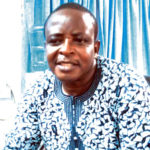
You recently retired from the civil service. What was the experience like?
It was interesting, but sometimes, it can be quite hectic combining the three things I was doing – teaching, working in the ministry and taking care of the home. However, I was able to handle it by the grace of God.
It is said sometimes that it is not easy to work with women. How would you describe your experience working with women as the president of the women’s organisation in Ijebu North diocese?
God trained me to function in such position. One needs the spirit of sacrifice and must be very accommodating. One must embrace humility. That’s not to say there have not been challenges, but as long as it is God we serve, and we put Christ first, there is nothing God cannot do.
How did you meet your husband?
We attended the same secondary school, the same church and we were both members of the choir. In fact, he was the choir master at the time. He wasn’t a priest when I met him. He was a teacher at the time. He went to teachers’ college before joining the priesthood. We courted for 10 years and got married in 1984.
Before you met him, did you have any idea you would be a cleric’s wife?
I had no idea. Even if I didn’t have the intention of marrying a priest, I believe when God says something will happen, no matter who I meet, God’s word will supersede.
With your experience in marriage, what advice would you give women on making their homes work?
The couple needs to understand that since their backgrounds are different, ideas would be different. I remember when I first met my husband, I sometimes complained. Sometimes, I went as far as writing down his offences. One time, my husband bought two 2A exercise books, gave me one and took one. He said we should each put into writing every time we offended each other, and at the end of the month, we would compare notes. At the end of that month, when we compared notes, while mine was filled with a list of his offences, his was filled with the words ‘I Love You.’ I felt really ashamed of myself and that was the last time I kept record of his offences. We overlook our differences, pray together and if there is any problem, we sort it out amicably.
How about for those who hold the unique roles of being pastors’ wives?
From time to time, we organise retreats, workshops and counselling sessions for pastors’ wives. We counsel them that being in such position is through the grace of God. They have to be committed to their homes and serving God faithfully. Sacrifice, endurance, patience are all important. We must learn to give our husbands full support.
ALSO READ: We must develop better economic model —Bishop Kuponu
You clocked 60 on June 12, 2018. How does clocking a milestone age make you feel?
I am so grateful to God that I reached that age. When I was small, I was given six marks on my face and when I asked, they said when I was born, I was given the name ‘Ekundayo,’ because I always came and left. That’s why I surrendered my life to God for protection, and that protection I have received on a daily basis.
If God gave you the opportunity to rewrite any part of your life, what would that be?
Sometimes, I wish the story behind my name wasn’t so sad. However, I’m glad knowing that my name means that even when I shed tears, there would be turnaround for joy. And for that, I’m grateful to God.
You retired as head teacher. When you look at Nigeria’s education sector, would you say you are satisfied with how far we have come?
Not really. There was a time when teachers were required to have Grade II. Now, that has been scrapped. The Grade II qualification saw to it that teachers were skilled in preparation of lessons notes, understanding teaching aids, as well as improving teaching proficiency. Nowadays, sometimes, even those who have degrees cannot defend their certificates in terms of the discipline and quality expected of them. The education sector in Nigeria must be given full attention in terms of infrastructure, personnel and other areas of development. For the pupils and students too, there is need to look into reducing the distractions and provide them with words of encouragement, so they can focus better on their studies. Government at all levels also have roles to play. The Lagos State government has done much to improve the sector and other states can take a cue from that, especially in the provision of infrastructure, and availability of teaching materials.





